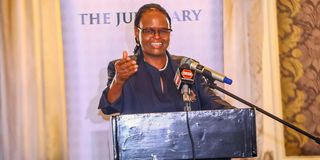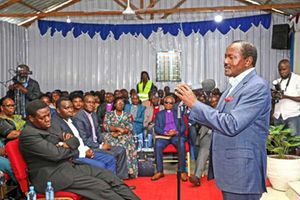CJ Marth Koome: Talks don’t mean giving up autonomy

Chief Justice Martha Koome during a meeting with Heads of Mission and Development Partners at the Villa Rosa Kempinski Hotel in Nairobi on January 30, 2024.
Chief Justice Martha Koome has said that dialogue with the Executive led by President William Ruto does not mean the Judiciary will give up its independence.
In a meeting with diplomats, mostly heads of mission and development partners in Nairobi yesterday, the CJ said the autonomy of the Judiciary was non-negotiable.
Justice Koome recently held talks with President Ruto after the President and his allies attacked the Judiciary, saying it is full of corrupt judges working in cahoots with some unnamed forces to sabotage the current regime’s development projects.
“We will live up to the ideals of judicial autonomy as protected by the constitution. Even as we open ourselves to dialogue, one thing we will not open ourselves to is our decision-making process. We will never discuss the merits of a case,” she said.
The process of making decisions in court, the CJ said, is the preserve of judicial officers, who do so based on evidence and law.
“If that decision is found to be erroneous and unacceptable to any party, they should appeal to the Court of Appeal or whatever mechanism is provided by law...we recognise that only an independent Judiciary can uphold the rule of law and ensure the stability of the State,” she said.
Justice Koome then urged heads of mission and development partners to be ambassadors of the Judiciary by advocating for respect for institutional independence.
The CJ went on to note that judicial independence does not mean that there should be no scrutiny, adding that they are ready to engage in dialogue that will help curb corruption.
Instead of trying to delegitimise the courts, the CJ urged Kenyans, including the Judiciary, to have very frank conversations about corruption and identify the miscreants who bring corruption into the justice system.
“Why do we have the mechanisms to investigate and prosecute crimes, but we don’t prosecute these cases of corruption? We are ready as the Judiciary to open ourselves to this introspection and see who is not doing their job and who is taking bribes,” she said.
The CJ and the Director of the Kenya Judicial Academy, Justice Smokin Wanjala, said they were in the process of setting standards for judicial training and revealed that 60 per cent of the Judiciary’s training budget was funded by development partners.
Discharge mandate
The heads of the High Court and the Court of Appeal went on to reveal that they had serious staffing shortages. Principal Judge of the High Court Erick Ogolla said High Courts across the country had only 78 judges, making it difficult for them to effectively discharge their mandate.
“On average, a judge has to deal with 1,450 cases. With your (development partners) support, we can reduce this to 600 cases per judge,” he said.
Justice Linet Ndolo said there were 21 judges of the Labour and Industrial Relations Court, up from 12 two years ago, and that they were working to clear the backlog.
At the Environment and Land Court, Presiding Judge Oscar Angote said there were 53 judges in 37 counties, noting that 10 counties are not well covered.
Justice Fatuma Sichale, the Judicial Service Commissioner representing the Court of Appeal, said the 29 judges at the court need all the support to handle all the appeals filed across the country.
“The Sh29 billion budget allocated to the Judiciary is not enough to support us in carrying out our mandate and we know that with your support we can achieve more,” she said.




